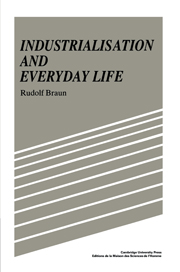Book contents
- Frontmatter
- Contents
- Prefaces
- Acknowledgements
- Note on measures and coinage
- Introduction
- 1 The preconditions for industrialisation
- 2 Changes to the structure of family and population in the industrial regions
- 3 Life and society of the population engaged in industry
- 4 The impact of industrialisation on the house and the rural economy
- 5 Work in the putting-out industry and its effect on the life of the common people
- 6 The outworkers' attitude to poverty and crises
- 7 Conclusion
- Postscript
- Appendix: a note on the administrative structure and social stratification in the countryside of Zurich during the Ancien Régime
- Notes
- Sources and bibliography
- Index
Introduction
Published online by Cambridge University Press: 16 March 2010
- Frontmatter
- Contents
- Prefaces
- Acknowledgements
- Note on measures and coinage
- Introduction
- 1 The preconditions for industrialisation
- 2 Changes to the structure of family and population in the industrial regions
- 3 Life and society of the population engaged in industry
- 4 The impact of industrialisation on the house and the rural economy
- 5 Work in the putting-out industry and its effect on the life of the common people
- 6 The outworkers' attitude to poverty and crises
- 7 Conclusion
- Postscript
- Appendix: a note on the administrative structure and social stratification in the countryside of Zurich during the Ancien Régime
- Notes
- Sources and bibliography
- Index
Summary
The following enquiry is concerned with the social and cultural upheaval which took place during the seventeenth and eighteenth centuries in a rural environment under the influence of the putting-out, or cottage, industry. Given the folklorist nature of our enquiry, we need to recognise how the fundamental conditions of human life and society are changed when men depend wholly or partly on industry for their livelihood, and how these changes in the lives of the common people are revealed in popular culture. The countryside of Zurich has been chosen for our enquiry, especially the Zurich Oberland, a region which underwent very early and intensive industrialisation. Three hundred years later, this region is nowadays still faithful to the various branches of the textile industry.
A folklorist approach
Folklore is a branch of the arts, a definition which obliges us to understand the changeability of all the conditions of human existence in terms of people's changing mental attitudes. Without promoting a one-sided theory of the spiritual and causative interpretation of history and culture, it should simply be emphasised that the arts have the task of perceiving economic and technical changes – to wit industrialisation – against the background of a development in mental history which preceded and accompanied the changes. It is from this vantage point that we will look for the driving forces of history and try to extrapolate them from their secondary effects. Deducing economic changes from particular constellations in mental history is essentially a matter for economic historians. The folklore analysis begins where economic history (and history generally) stops.
- Type
- Chapter
- Information
- Industrialisation and Everyday Life , pp. 1 - 7Publisher: Cambridge University PressPrint publication year: 1990

